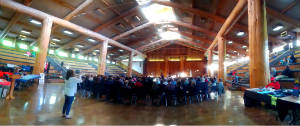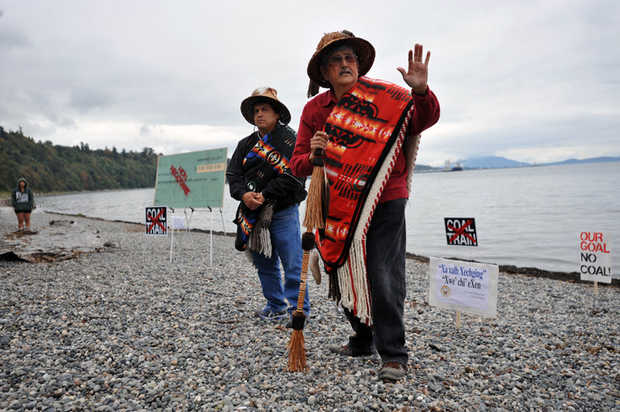By Ana Chamgoulova, Summer Law Student Volunteer at West Coast Environmental Law, 25 June, 2014
The 10 day Water Festival hosted by The Lummi Nation of Washington State wrapped up on June 22nd. I had the opportunity to attend part of the festival, along with another law student volunteer and WCEL Staff Lawyer, Eugene Kung. The part we were present for was the Stommish Sacred Summit, which consisted of a day of presentations on the topic of Sacred Obligations, a talk by Winona LaDuke, and a rally against a proposed coal port in the Salish Sea. These events hold great relevance for the environmental movement and the fight against fossil fuel projects in Canada.

The Lummi are Coast Salish people, whose combined traditional territory stretches throughout the Pacific Northwest, from the northern limits of the Strait of Georgia through Puget Sound (together known as the Salish Sea), and covers present-day Vancouver, Victoria and Seattle. The Lummi have close trade, cultural and family ties with Tsleil-Waututh, Squamish and Musqueum, the Coast Salish First Nations that may be more familiar to the Canadian audience. The Oregon Treaty of 1846, which set the present-day Canada-USA boundary, determined their divergent courses of history. And yet, as my fellow law student volunteer Elizabeth Zarpa put it:
Their lineage and kinship with other Coast Salish nations stretches across international boundaries here in Canada. The struggles which they face against natural resource companies imposing pipelines, railways and tankers throughout their territories is similar to what other First Nations in Canada experience.
Stommish Sacred Summit
The Water Festival includes such events as a film festival, canoe races, a carnival and the Sacred Summit, and it is part of the cultural revitalization efforts by the Lummi Nation. The Sacred Summit in particular was organized in accordance with the Lummi traditional laws, opening with a prayer and selection of prominent community members to act as witnesses. I am personally always honoured and excited to attend such events, because of the palpable resilience and sacredness of Indigenous traditions. It helps that there is usually bannock being served.
The day’s events were held in a giant longhouse supported with massive cedar trunks, some of which have been carved into beautiful totem poles.

The day began with welcomings from elected council member Jay Julius and Hereditary Chief Tsilixw. Despite the two representing different sources of leadership, one from a Tribal Council established by the United States government and the other from a traditional system of governance, they both spoke about the sacred obligation to protect the environment in their traditional territory. To them, the environment is not something external to human life, but is the source of their livelihood. Lummi have survived and thrived off of salmon, clams, mussels and other seafood abundant throughout the Salish Sea since time immemorial.
Resource extraction projects would inevitably contaminate the coastal waters and the seafood and so they would threaten the very way of life of the Lummi. The idea of protecting the environment is not just rhetoric for them, but is a matter of survival and sacred duty. We also heard from Jewell James, who Environmental Law Alert readers may remember as the master carver and spiritual leader that gifted a totem pole to the Tsleil-Waututh as a symbol of solidarity among Coast Salish Nations opposing destructive fossil fuel projects.
The Canadian Connection
The cross-border links became even more obvious when the two Canadian guests spoke: Rueben George, the Sundance Chief of Tsleil-Waututh, and Eugene Kung, staff lawyer at West Coast Environmental Law. Rueben spoke of the shared culture of the Lummi and Tsleil-Waututh. Despite the many years of being separated by an international border, their shared understanding of the responsibility for the environment persists. For the Tsleil-Waututh, the idea of sacred obligations to the environment found expression in the Sacred Trust Initiative, whose goal is stopping the Kinder Morgan Trans Mountain pipeline expansion. Their resistance was motivated by their experience with the existing pipeline, which has had four major leaks since 2005. Because of this and other industrial developments in the Burrard Inlet, it has been harder and harder for the Tsleil-Waututh to practice their traditional way of life. Rueben doesn’t want this to happen to the Lummi, and he encouraged them to keep up their fight against the local resource extraction projects.
Eugene then spoke more specifically about the Kinder Morgan pipeline expansion proposal, the flawed National Energy Board process, and the legal aspects of the resistance to this project. This Canadian project is important for the Lummi, because the tanker traffic, set to increase to 400 tankers a year, would cross their territory and threaten their water as well.
The environment transcends national borders, contaminants transcend national borders, just as the environmental movements and the Coast Salish culture should transcend national borders. Eugene also explained how strong indigenous laws can help the greater environmental movement through such legal tools as the duty to consult and accommodate where Aboriginal rights and title are involved.
Coal Port at Cherry Point
The Lummi are facing their own fossil fuel project: a proposal to build a deep-water marine terminal at Cherry Point, which would become North America’s largest coal port, exporting up to 54 million dry metric tons per year. The project got off to a rocky start with the Lummi Nation, when in 2011 the company behind the proposal failed to obtain government permits for some preliminary work but went ahead with it anyway and ended up disturbing an ancient burial site. Now, as the Sacred Trust Initiative reports, “The Lummi Nation is concerned not only about the destruction of their sacred sites, but also about the deterioration in air quality and contamination of water and soil as a result of fugitive coal dust dispersal. Shipping of coal could also have devastating impacts on fishing and fishing rights along the Washington coast.” The Lummi do have a strong legal case based on treaty fishing rights, so much so that the US Army Corps of Engineers considered denying permits for the proposal based solely on their opposition.
Getting Out of the Fossil Fuel Economy
The highlight of the Sacred Summit for me was a very inspiring talk by Winona LaDuke, an internationally renowned Anishinaabekwe (Ojibwe) activist. People from all over Whatcom County, Bellingham and Seattle joined us for her talk. Environmental work can sometimes feel like a game of whac-a-mole, with a new pipeline or coal mine or refinery being proposed every few months. We live in the fossil fuel age, from the car-friendly infrastructure of our cities to the policies and subsidies our governments use to promote an oil-based economy. Ms. LaDuke reminded us of the bigger picture, of the dangers posed by climate change, of the inevitable end to big oil. We should be aiming for a graceful transition instead of a catastrophic crash, and we should do it as soon as possible. Every pipeline that we stop should give our governments pause about their energy policies. Every renewable energy project and conservation measure will decrease our own dependence on fossil fuels.
 |
| The WCEL delegation at the end of a long day, left to right: Ana Chamgoulova, Elizabeth Zarpa and Eugene Kung |
The evening wrapped up by calling forward the witnesses, who gave their reflections on the evening. Their job throughout the day was to make sure everything was done properly, and their reflections legitimized the event according to traditional Lummi law. I could feel the significance of following protocol and doing things property in this great longhouse, and how the Lummi drew strength from the thousands of years of history so they can continue to fulfill their sacred obligations.
West Coast Environmental Law has long been working within the Canadian legal system to advance and uphold indigenous laws to protect the environment. This trip gave me a more international perspective on our work and reminded me that there are a lot of people – Aboriginal and not – fighting for a better world. This Earth is of all of our home.
By Ana Chamgoulova, Summer Law Student Volunteer at West Coast Environmental Law
















